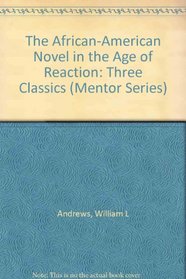Brian M. reviewed The African-American Novel in the Age of Reaction : 3 Classics Iola Leroy or Shadows Uplifted The Marrow Tradition The Sport Gods on + 70 more book reviews
From the back cover: In 1896 the Supreme Court ruled in favor of the South's "seperate but equal" racial doctrine. Around this time, three powerful but very different black voices responded in protest, and they did so in these three exceptional novels. Harper's "Iola Leroy" follows the struggles and soul searching of a light skinned black woman during the turbulent years of the Civil War/Reconstruction. Chesnutt's "The Marrow of Tradition" knits together the lives of a rich white family and a mixed race couple who face the violent results of white supremacy in a North Carolina town. Dunbar's "The Sport of the Gods" is a portrait of a fictional twentieth centrure Harlem and the disturbing depiction of the plight of black families in the urban ghetto that anticipates the writings of Richard Wright. These novels remain significant as works that influenced a nation's conscience as well as fine examples of early african american fiction.




